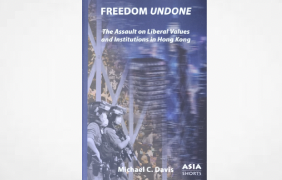The Hong Konger reviews this title
Hong Kong was never a full democracy, but it was vibrant. Its people lived and breathed a spirited media that was prone to stretching the imagination of resistance and resilience. Protest processions brandished caricatures and placards in an almost carnival mood.
For all its flaws and challenges, Hong Kong society upheld its built-in institutions, striving to protect basic freedoms and hold the government accountable.
Then, in a few short years, the city became unrecognisable. It went from being a beacon of freedom in Asia to a place of political and economic uncertainty. How did it come to this? The latest book of constitutional law scholar Michael Davis, Freedom Undone, sheds light on Hong Kong’s express evolution to the point of no return.
Davis has expertise befitting the scope of this topic, as one who taught human rights and constitutional law at the Chinese University of Hong Kong and the University of Hong Kong for more than three decades. His publication was timely, coming as it did before the city’s passage of sedition and secession laws this month. The new Safeguarding National Security Ordinance will take effect on 23 March.
The book delves into whether Hong Kong’s built-in institutions can continue to be maintained, which boils down to a question of rule of law. Instead of proffering a straightforward conclusion, the author cites examples to show how the city’s freedoms are being undone.
Something that is undone, by definition, used to exist. Hong Kong was different from mainland China, particularly in the freedom of expression and freedom of assembly, says Davis. The scholar arrived in the city in 1985, a year after the Sino-British Joint Declaration was signed, and experienced these freedoms by joining a million-strong march after the 4 June 1989 Tiananmen crackdown in Beijing.
Read more




